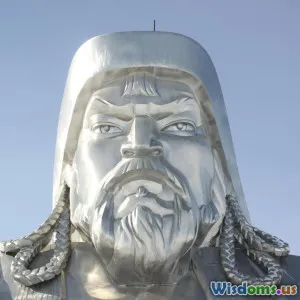
Inspiring Figures in History
8 min read Discover the lives and legacies of history's most inspiring figures who shaped our world through courage, vision, and resilience. (0 Reviews)
Inspiring Figures in History: Legends Who Shaped Our World
History is a vast tapestry woven with the threads of countless individuals’ actions—some quiet and unnoticed, others bold and transformative. Among these are figures whose lives and legacies continue to ignite inspiration. They broke barriers and redefined what was possible, shaping societies and fueling progress in ways that still resonate. This article explores some of the most inspiring figures in history, illuminating why their stories remain relevant and motivating.
The Power of Vision: Leaders Who Altered the Course of History
Throughout history, visionaries and leaders have galvanized nations and movements, often in the face of overwhelming odds. Their visions were sometimes met with skepticism or outright hostility but ultimately moved humanity forward.
Nelson Mandela: Forging Peace from Struggle
Nelson Mandela (1918–2013) stands as a global symbol of resilience and reconciliation. Imprisoned for 27 years due to his fight against apartheid in South Africa, Mandela emerged not with a thirst for revenge but with a powerful message of unity. His leadership culminated with South Africa’s first multiracial elections in 1994, marking a peaceful transition from institutionalized racial segregation.
Mandela’s profound statement—"I am not a saint, unless you think of a saint as a sinner who keeps on trying"—underscores his humility and relentless commitment to justice. His presidency showed how forgiveness and inclusive leadership can heal a fractured society.
Joan of Arc: Courage That Changed a Nation
Joan of Arc (1412–1431) is emblematic of courage and faith. At barely 17, this French peasant girl claimed divine guidance to lead French troops during the Hundred Years’ War. Her leadership was instrumental in lifting the siege of Orléans, turning the tide against the English.
Despite being captured and condemned as a heretic, Joan’s legacy endured, inspiring countless generations. Her story challenges preconceptions about leadership and demonstrates how conviction can defy norms and inspire dramatic change.
Innovators and Thinkers: Shaping the World with Ideas
Innovators and intellectuals have shifted paradigms by challenging the status quo and advancing knowledge.
Marie Curie: Pioneering Science Against All Odds
Marie Curie (1867–1934) was a trailblazer whose groundbreaking work in radioactivity earned her two Nobel Prizes—in Physics (1903) and Chemistry (1911). As the first woman to receive a Nobel and the only person awarded in two scientific fields, she shattered gender barriers in science.
Curie’s discoveries not only paved the way for advances in cancer treatment and nuclear physics but also symbolized perseverance in a male-dominated domain. She once said, “Nothing in life is to be feared; it is only to be understood.” This ethos drives scientific inquiry to this day.
Leonardo da Vinci: The Renaissance Polymath
Leonardo da Vinci (1452–1519) epitomizes the essence of curiosity and multi-disciplinary genius. From art masterpieces like the Mona Lisa to innovative engineering sketches, da Vinci’s insatiable quest for understanding the natural world exemplifies boundless creativity.
His notebooks reveal meticulous study of anatomy, mechanics, and flight, centuries before such concepts could be realized. Leonardo’s legacy teaches us the value of integrating diverse areas of knowledge to foster innovation.
Champions of Justice: Activists Who Changed Human Rights
The pursuit of equality and justice has been propelled by courageous activists who challenged injustices and mobilized societal shifts.
Martin Luther King Jr.: The Voice of Nonviolent Protest
Martin Luther King Jr. (1929–1968) led the American civil rights movement through advocacy of nonviolent resistance. His dream of a society where people are “judged by the content of their character” inspired landmark changes like the Civil Rights Act of 1964.
King’s leadership culminated in powerful moments like the 1963 March on Washington, where his "I Have a Dream" speech remains a beacon of hope for racial equality. His commitment to peaceful protest demonstrated that transformative change arises from moral conviction and collective action.
Malala Yousafzai: Education as a Weapon for Change
Malala Yousafzai (born 1997) is a contemporary beacon of courage. Shot by the Taliban for advocating girls’ education in Pakistan, Malala survived and now champions global access to education.
As the youngest Nobel Peace Prize laureate, her mantra—“One child, one teacher, one book, one pen can change the world”—underscores how education empowers societies and breaks cycles of oppression.
The Enduring Impact of Historical Inspiration
What ties these figures together is an extraordinary commitment to vision, innovation, justice, and humanity. Their stories remind us that change is possible through courage and dedication, often catalyzed by individual actions.
In today’s complex world, their legacies offer relevant lessons:
- Vision matters: Mandela’s reconciliation teaches the strength of unity over division.
- Innovation propels progress: Curie’s scientific rigor continues to inspire breakthroughs.
- Justice requires courage: King’s and Malala’s activism demonstrate peaceful resistance’s extraordinary power.
By studying these remarkable men and women, we gain more than historical knowledge—we inherit wisdom to face contemporary challenges with creativity and resolve.
“History will be kind to me for I intend to write it.” – Winston Churchill
Let us embrace the inspiring figures in history not just as distant heroes but as active guides illuminating the path forward.
References
- Mandela, Nelson. Long Walk to Freedom. Little, Brown and Company, 1994.
- Curie, Marie. Nobel Lecture, 1903 & 1911.
- King Jr., Martin Luther. Why We Can’t Wait. Harper & Row, 1964.
- Yousafzai, Malala. I Am Malala. Little, Brown and Company, 2013.
- Leonardo da Vinci: The Notebooks. Various editions.
These inspiring histories continue to challenge and motivate millions to carve out meaningful change in their own lives and societies.
Rate the Post
User Reviews
Popular Posts





















